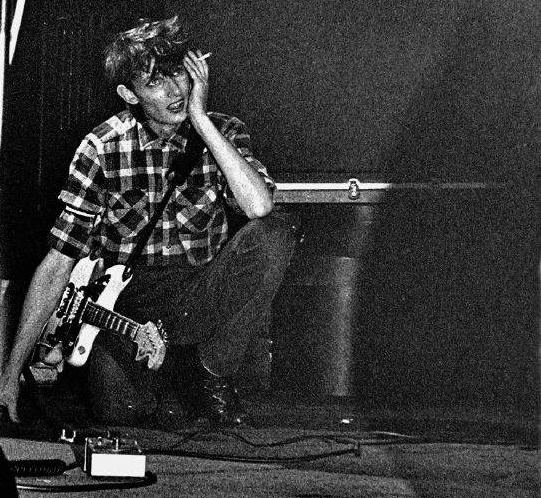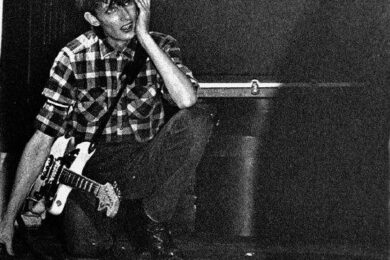"Are you a punk or a poof?" was apparently the joking challenge leveled at a group of Australian school boys in the late 1970s.
Some of them would take the challenge to its maximum and form a series of bands that would culminate in The Birthday Party – one of the most feral and no-holds-barred bands of all time. Their expressive and wild music also packed a fierce and filthy intellect as it thrilled the underground music scene of the early 80s.
Frontman Nick Cave has become an international star – a dark-hearted preacher who sings songs of tender love or demonic filth with a leering glee. The charismatic star still stalks the stage with a powerful presence but it is his Birthday Party performances that introduced the world to an astonishingly dangerous persona.
To his side was a stick-thin razor sharp guitarist consumed with the feral power of his instrument, so little utilised by most other players. Rowland Howard would shimmy with a devilish glee – at one with his instrument as he carved out great slices of six string thunder. His guitar could twang deep and dark, like Link Wray gone bad; it could skree free jazz filth or it could cut loose with the power of The Stooges. It was the cigarette in the mouth of rock & roll. An astonishing sound capturing all the potential for freedom that the instrument posseses in a life affirming blues howl. It was the perfect foil to Cave’s astonishing poetry. And in a world of too many guitar players Rowland Howard actually managed to produce a distinctive sound all of his own. Far too rare an achievement with an instrument that is regularly abused by the average and the cloth eared who adhere to tired old rules, techniques and clichés. Players like Rowland Howard arrive only occasionally – a handful in each generation – are barely recognised by the dull mainstream that rewards effort over genius and plodding hard work over brave and instinctive originality.
So it’s with great sadness that I have to type this obituary for one of the greatest guitar players of my generation.
Rowland Howard lived a rock & roll life full of flick-knife danger and skinny hipster malevolence, and was one of those characters that you kind of thought would be around for a lot longer than this. His death at 50 from cancer is oddly shocking and sad.
Rock & roll is a mean and dirty business and it burns out the bright young sparks who briefly flicker fiercely near its flame like tousled-haired youth full of the arrogance of imagination. Last year we tragically lost Ron Asheton and Lux Interior – the two music scene deaths that really mattered in ‘09 and this year we lose Rowland Howard.
He was first a member of The Boys next Door and was noticed when he wrote the underground hit, ‘Shivers’ at the age of 15.
But it was the Birthday party where he will always be remembered for his feedback drenched guitar and brilliant imaginative songs written round a heavy bass line delivered by the late Tracy Pew. The band’s provocative live assault and chaotic lifestyle saw them move to London and then to Berlin leaving a trail of fearsome records and live gigs that chewed up and spat out life like so few other bands.
Howard’s guitar style and song writing was one of the key components of the Birthday Party, for two albums and a series of singles. Onstage Rowland was the skinny bad ass guitar freak with the ‘six strings that drew blood’, as Nick Cave once sang. His pop eyed expression and dishevelled hair made him a charismatic foil for Cave as well as an arresting figure of the age himself.
The last two Birthday Party EPs contained some of his greatest guitar work, deep sonorous riffs and garbage can twanging that echoes the band’s kinetic chaos with a delta blues instinct sieved through a punk rock intensity. Few rock bands have made records as dark and deadly as this.
It was because of this intensity that they collapsed. There was no way the competing talents of Nick Cave and Rowland Howard could be contained in one unit.
Howard and Cave had creative differences and Howard then left the Birthday Party to become a member of Crime and the City Solution, a band led by Simon Bonney, and later formed These Immortal Souls with Genevieve McGuckin, Harry Howard, and Epic Soundtracks.
Nick Cave has gone on to become one of the great elder statesmen stalking the horizon with an endless supply of great bad ass records, his talent fired and forged by his discipline. Yet without Cave’s work ethic his foil floundered, leaving behind intermittent moments of genius. He made a singularity brilliant record with Lydia Lunch – a powerful swaggering take on Lee Hazelwood‘s ‘Some Velvet Morning’ which for me is the record that I will always remember him by. His sneering vocal alone on that record makes it one of the great releases of the period and the cover shot of him and Lydia Lunch drips pure sex. The pair of them further collaborated on other songs that dripped full of erotic violence and melancholy.
It was when Crime and the City Solution shared a bill with the Membranes that I met him. This was great as we had always loved the Birthday Party – fellow travellers in that noisy space in some far off time. All our post punk disgust at the vile world was spewed and skewed back in loud and loose music that fought with the audience. The gig was in Thames Poly – a damp, stinking venue of the mid 80s London underground where every week some miscreant rock & roll thrilled those that got it and forced fingers in the ears of those that didn’t. We met in the cramped backstage hang out. He immediately revealed himself to be a gent. I met him occasionally after that – in the downstairs bar at the Hacienda after a show there by the late Nikki Sudden, who he was playing guitar with at the time. We talked guitars and blues and punk rock for a long while.
It’s a shame he never had the space to create that he should have done. He went back to Australia and would play intermittently with several different bands and was just beginning to get the respect his genius deserved when he became ill with liver cancer.
A few months ago I got in touch with him via myspace. I was going to ask him if he wanted to collaborate on something; he never replied. I didn’t know he was ill and his death came as a shock.
So Rowland, thanks for that guitar and thanks for those cool moves and that startled, dangerous, staring face, there is a clutch of us out here who will always remember your feline grace and genuinely dangerous guitar and even now we can hear you sneer "some velvet morning when I’m straight…"
For you Rowland, this is that velvet mourning.



